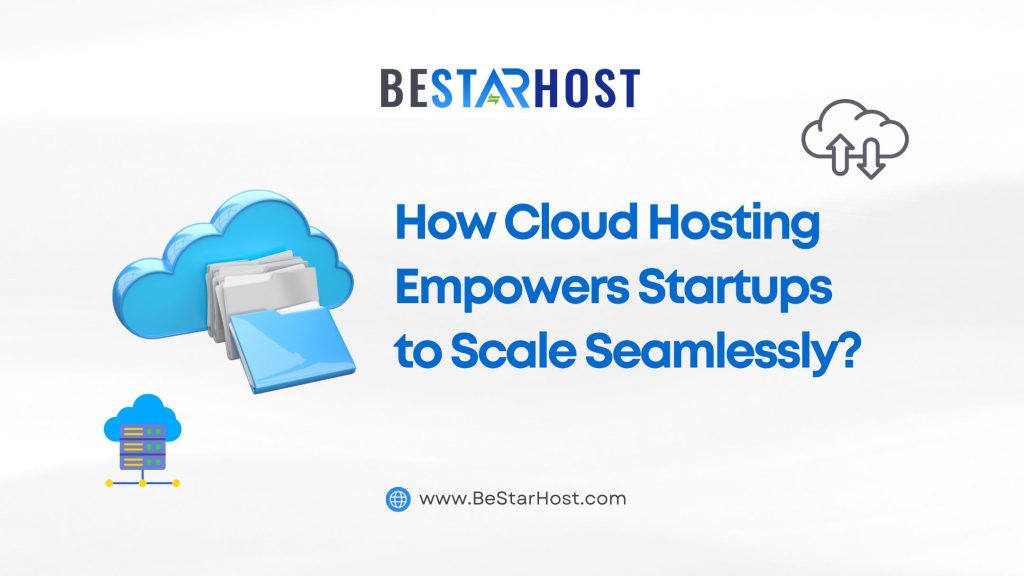
Startups thrive on innovation and agility. To achieve rapid growth while maintaining efficiency, startups need a robust infrastructure that supports scalability, security, and cost-effectiveness. Cloud hosting for startups is the game-changer in this arena, enabling businesses to scale seamlessly. Let’s explore how cloud hosting empowers startups to achieve their goals.
1. What is Cloud Hosting and Why Does It Matter for Startups?
Cloud hosting involves hosting websites or applications on a virtual server that pulls its resources from multiple interconnected servers. This setup offers flexibility, reliability, and scalability—key factors for startups looking to grow efficiently.
Key Benefits of Cloud Hosting for Startups:
- Scalability: Add or reduce resources as needed.
- Cost Efficiency: Pay-as-you-go pricing models eliminate unnecessary expenses.
- Reliability: Minimized downtime due to server redundancy.
- Accessibility: Remote access from anywhere boosts productivity.
2. Why Startups Choose Cloud Hosting Over Traditional Hosting
Startups face unique challenges, such as fluctuating traffic and limited budgets. Traditional hosting options like shared or dedicated hosting may lack the flexibility required to handle these challenges effectively.
Advantages of Cloud Hosting Over Traditional Hosting:
- Dynamic Resource Allocation: Cloud hosting adjusts resources automatically based on traffic demands.
- Better Performance: Cloud servers distribute load efficiently for faster speeds.
- Enhanced Security: Partnering with secure cloud hosting providers ensures robust data protection.
3. The Role of Scalability in Startup Success
For startups, scalability is not just an option—it’s a necessity. Sudden traffic surges from viral marketing campaigns or product launches can strain traditional hosting solutions.
How Cloud Hosting Enables Seamless Scaling:
- Horizontal Scaling: Add more servers to handle increased demand.
- Vertical Scaling: Upgrade server resources like CPU or RAM.
- Auto-Scaling Features: Many cloud services for startups include automated scaling, so businesses can focus on growth without worrying about technical bottlenecks.
4. Finding the Best Cloud Hosting for Startups
Choosing the right cloud hosting provider can make all the difference for a startup. Factors like performance, cost, and customer support should be carefully evaluated.
Features to Look for in Cloud Hosting Providers:
- Pay-As-You-Go Pricing: Avoid upfront costs and pay only for what you use.
- User-Friendly Management Tools: Simplify server configuration and monitoring.
- 24/7 Support: Access to reliable customer support is crucial for resolving issues quickly.
- Global Data Centers: Ensure low latency for a global audience.
Recommended Secure Cloud Hosting Providers:
- AWS (Amazon Web Services): Known for scalability and advanced security features.
- Google Cloud Platform: Offers robust AI and machine learning tools.
- Microsoft Azure: Ideal for startups needing integration with Microsoft products.
For businesses just starting, look for the best cloud hosting for startups offering free trials or startup credits.
5. Security: A Priority for Startups
Startups handle sensitive customer data, intellectual property, and business-critical applications. Partnering with secure cloud hosting providers ensures that data remains safe from breaches and downtime.
Security Features to Look for in Cloud Hosting:
- Data Encryption: Protects data during transfer and at rest.
- Regular Backups: Safeguards data against accidental loss.
- Firewall and DDoS Protection: Defends against external threats.
- Compliance Certifications: Ensure the provider complies with regulations like GDPR, HIPAA, or PCI-DSS.
6. How Cloud Hosting Supports Collaboration
Startups often rely on remote teams to access global talent. Cloud hosting facilitates seamless collaboration through centralized access to applications, databases, and tools.
Collaboration Benefits of Cloud Services for Startups:
- Real-Time Updates: Keep all team members on the same page.
- Shared Workspaces: Access project files from anywhere.
- Integrated Tools: Many cloud hosting platforms offer integrations with productivity apps like Slack, Trello, and Zoom.
7. Case Studies: Startups Scaling with Cloud Hosting
Example 1: A Fintech Startup Scaling Globally
A fintech startup used cloud hosting to launch in multiple regions simultaneously, leveraging secure cloud hosting providers for compliance with international regulations.
Example 2: A E-commerce Startup Managing Traffic Surges
An e-commerce platform successfully handled Black Friday traffic spikes by switching to the best cloud hosting for startups, enabling auto-scaling to manage increased demand.
8. Cost Efficiency: Optimizing Budgets with Cloud Hosting
Cloud hosting eliminates the need for expensive hardware and IT maintenance, allowing startups to allocate resources to other business-critical areas.
Tips for Cost Management:
- Opt for providers with transparent pricing models.
- Monitor resource usage regularly to avoid unnecessary costs.
- Utilize free or low-cost tiers offered by many cloud services for startups.
9. How to Transition to Cloud Hosting
Making the shift to cloud hosting might seem daunting, but a strategic approach ensures minimal disruption.
Steps to Transition:
- Evaluate Needs: Understand your current and future hosting requirements.
- Choose the Right Provider: Research and select a provider that aligns with your goals.
- Plan the Migration: Create a roadmap for data migration and downtime minimization.
- Test and Optimize: Run tests to ensure everything functions smoothly post-migration.
10. The Future of Startups with Cloud Hosting
As technology evolves, cloud hosting will continue to empower startups with advanced tools like AI, big data analytics, and IoT integrations. By leveraging cloud hosting for startups, businesses can remain competitive, agile, and prepared for the future.
Conclusion: Cloud Hosting as the Catalyst for Startup Growth
Cloud hosting is more than just a technical solution—it’s a growth enabler for startups. From scalability and security to cost-efficiency and collaboration, cloud hosting offers startups the tools they need to succeed. By partnering with secure cloud hosting providers and selecting the best cloud hosting for startups, entrepreneurs can focus on innovation and expansion without worrying about infrastructure limitations.
